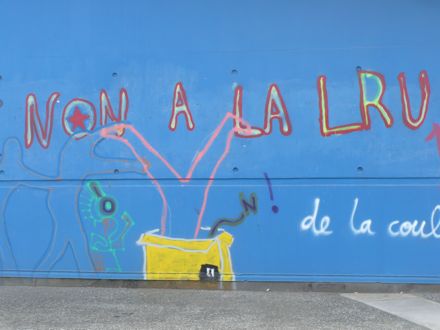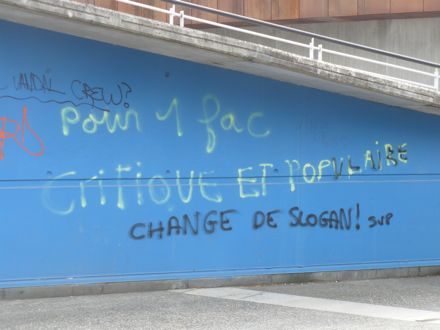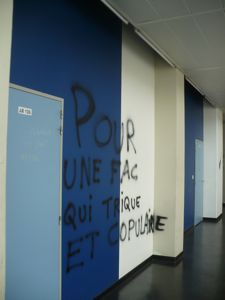Sometimes you hear claims that Americans don’t discuss social class. That it’s not a topic of public discourse. That it’s absent from our collective consciousness. (The late Molly Ivins, or else it was Barbara Ehrenreich, once claimed that ‘class’ was the one taboo topic in the op-ed pages.) To me it seems more accurate to say that class provokes collective anxiety in Americans. Certainly, this anxiety is unevenly distributed across the population; there’s a lot of rejection of class as a category, a lot of individualism, coupled to the ideology that “hard work has its just rewards.” But the anxiety keeps streaming through the social body, and occasionally it forms more pronounced eddies and ripples here and there.
Two essays in this week’s Chronicle of Higher Education serve as excellent examples of this anxiety. One is a statement of overt class guilt by William Pannapacker (pseudonym Thomas Benton). He tells us he dreams of going back to his old neighborhood, only to comment that:
I also know the old neighborhood is the Tahiti of the former-working-class imagination: a dream of unselfconscious authenticity, acceptance, and deep familiarity with the rules of social interaction. Of course, it is a self-serving myth.
I know that I don’t belong in the old neighborhood, either. I made my choices long ago; or perhaps others made them for me. No one is awaiting my return. I think I can hear what they’d say: “You seem to like playing the working-class hero for rich people. Whatever. Do it if it works for you. You never belonged here anyway, even when you were a kid. If I could get out of here, I would. So get on with your life. We’ll be fine without you.”
Meanwhile, back on the job as a tenured professor — certifying the inherited status of his middle-class students — the self-proclaimed “academic class traitor” romanticizes his alienation and mocks his own naïve posturing. He realizes there are no people whom he can serve without some inner conflict.
I like this as an analysis of the dynamics of class fantasy. The professor with working-class roots (a) romanticizes his past; only to (b) reject his fantasy as a dream of acceptance; followed by (c) fantasizing his own rejection by his old associates; and finally concluding (d) with the thought that all social life involves psychic conflict and contradiction. Which is true; but it’s a conclusion that entails resignation, depoliticization, disempowerment. Pannapacker ends by remarking that he tries to deal with these contradictions by keeping an eye out for working class kids and encouraging them as he can. This is certainly better than wholly abandoning academia to the affluent, but it will never lead to political change. After all, to aid working class kids in becoming upwardly socially mobile is to presuppose the existence of class divisions that one can only cross on a purely individual level.
Whereas if we read Gary Lavergne’s “College Admissions as Conspiracy Theory,” (a book review of recent work on the inequities of higher education,) we get the opposite, a rejection of class guilt, but one that also seems to lead towards naturalizing economic privilege:
It irks me to read four books telling me that my children are “privileged” or that I’m part of an “alliance of equals” oppressing the poor. In these books my children are “privileged” because my wife and I stayed married, have good jobs, paid attention to what our children did, bought them books, got involved in their schools, and shared the benefits of an education we earned — all of which resulted in our kids’ not being poor and not getting Pell Grants (which apparently makes them rich). I don’t remember seeing any distinction drawn between a “privileged” family like mine and one with five generations of Yale graduates in its lineage.
Lavergne comes from a poor Louisiana background and made his way “upward,” I gather from the surrounding paragraphs. Needless to say, there’s lots of social differentiation that doesn’t directly correspond to wealth or class status per se, and he’s right to point out that there’s social differentiation among the affluent. And an interesting theme here is the importance of intense parental labor in helping their children to reproduce their class status – by helping them to get suitable educations. (Educational institutions remain central to the social reproduction of elites, as they have been for a long time. Apparently medieval monasteries got a substantial fraction of their members from the unwanted children of the nobility.) But the key move here is the claim that Lavergne’s poor origins make him less a member of the upper middle class. In other words: his past becomes a way of disavowing his class privilege in the present.
Lavergne goes on to argue that:
All parents, even the rich ones, want what is best for their children. The parents considered “privileged” in these books aren’t spending their time forming alliances to oppress others. What are they supposed to do? Not use what they have, nor do what they can, to achieve what is best for their children?
And consequently he suggests that the fundamental problem isn’t that elite students are overrepresented but that there simply isn’t the institutional capacity to give good educations to all qualified applicants. He rightly points out that there isn’t the political will to fund public universities at an adequate level or capacity. He concedes, of course, that “elite colleges are overpopulated with affluent young people,” but he ends by arguing that:
Every day I see thousands of “privileged” students sent to our campus by their once-underprivileged parents. It wasn’t easy for many of them to get there. They don’t deserve a guilt trip. For millions of us, social mobility is alive and well in capitalist America.
It strikes me that Lavergne, who manages admissions research for the University of Texas-Austin, has to confront the ugly facts of class stratification in America more than most, and we might view his book review as an attempt to manage the same class anxieties that Pannapacker articulates more clearly, the anxieties that seem to accompany upward mobility in America more generally.
But it bears notice that, in the same issue of the Chronicle, an article describes a rampant sense among academics that they’re imposters, that they don’t deserve to be there, that they’re constantly afraid of being found out as fakes or phonies. Apparently such feelings befall people from many social backgrounds: as the journalist sarcastically comments, “we have come so far in the American postindustrial meritocracy that everyone has equal access to guilt-ridden feelings of fraudulence.” Valerie Young, who is on a lecture tour to publicize her findings, seems to send the message: relax, and accept your success! “We couldn’t have all gotten here for crap reasons,” a graduate student apparently commented after Young’s lecture.
These articles reveal an active ambivalence about the social order of American academia and one’s individual place in it. But they also portray an active struggle to naturalize the status quo, to get one to accept one’s role, to stop worrying, to put an end to anxiety. To me, it’s a relief that these struggles aren’t successful, that anxiety persists, and that restlessness may ultimately lead to reform.



